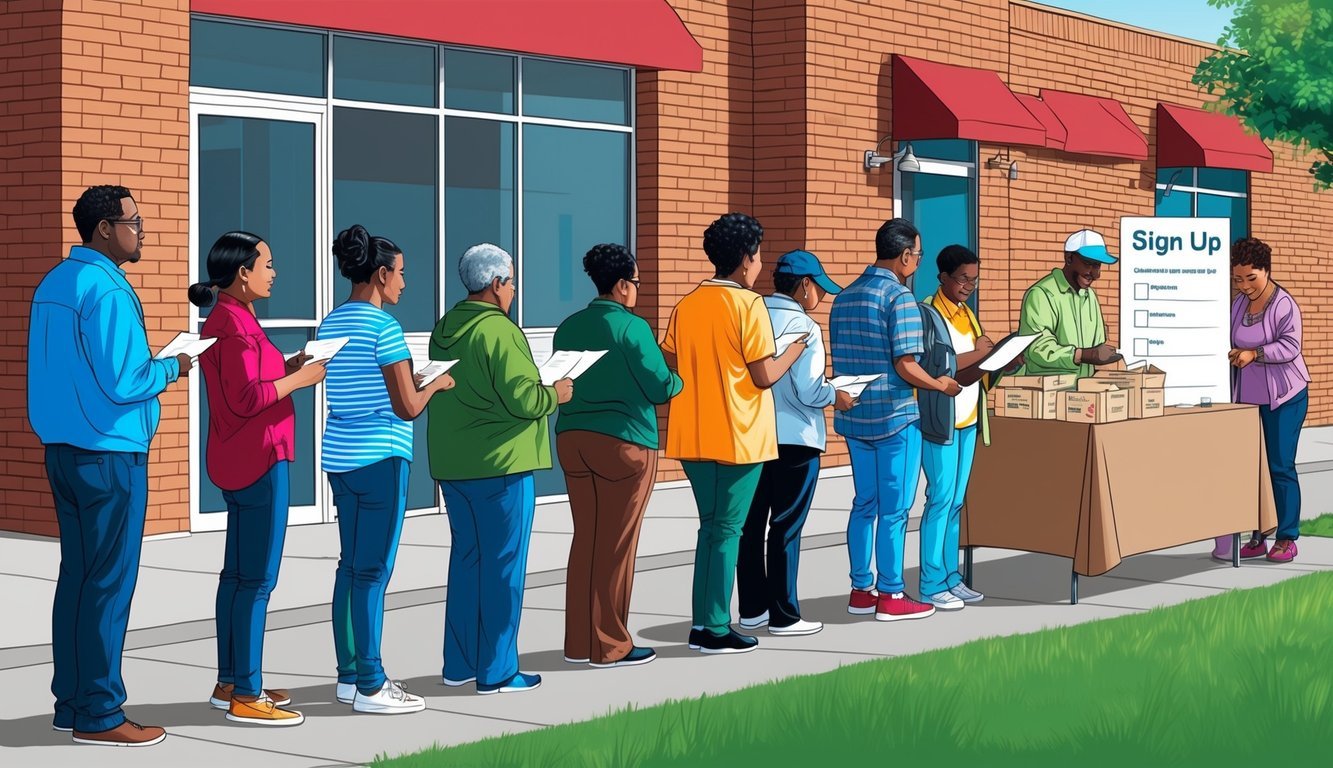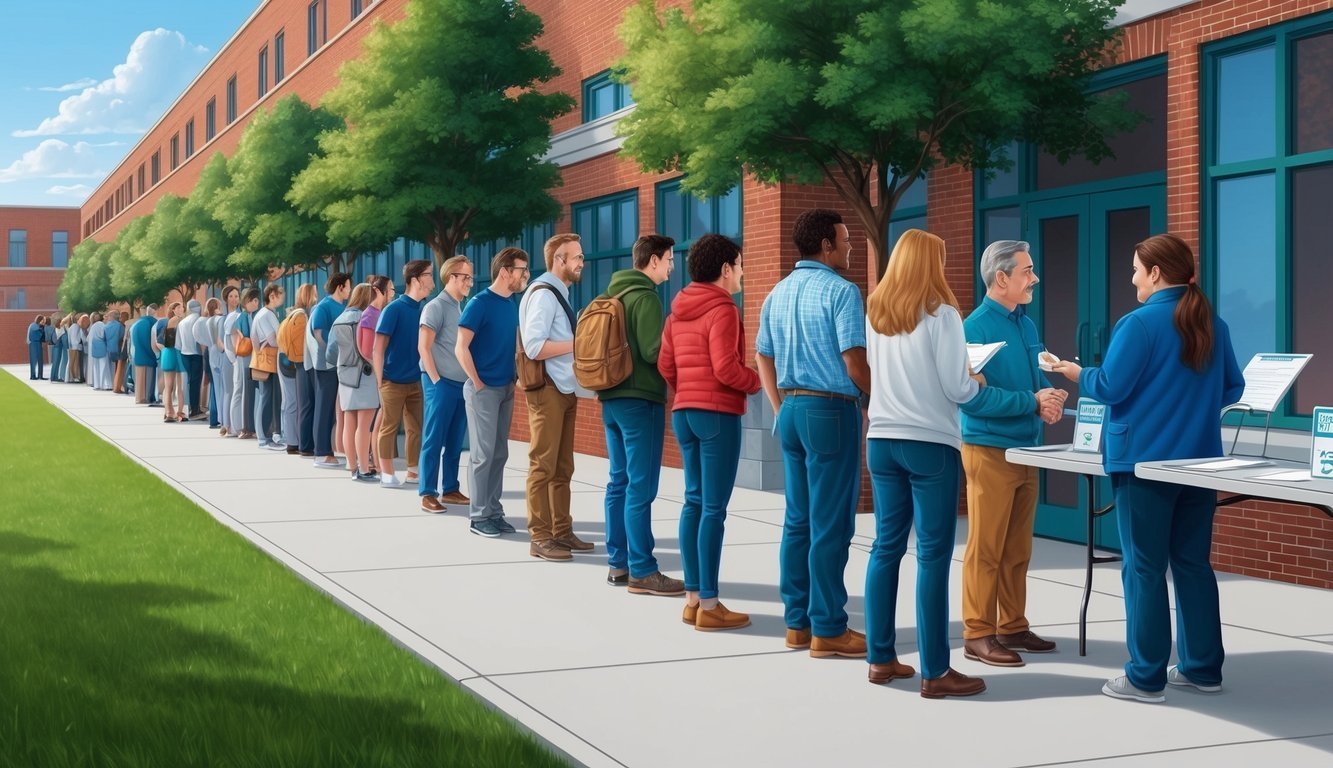Feeling a bit peckish and anxious about what’s for dinner? Food banks are here to rescue you! These community heroes hand out free food to those who need it.
And guess what? Signing up is often a breeze. You can find a food bank near you and get help in no time.

Food banks are pretty flexible with how you can get your groceries.
Some have drive-thru pantries, where you can grab boxes of food straight from your car—no need to get out and brave the cold! Others roll out mobile pantries to bring food right into your neighborhood, and there are always the classic food pantries where you can pick and choose what you want.
To sign up, you usually need to show proof of where you live and how many are in your family.
Don’t stress if you’re missing some paperwork; food banks are there to help—and they don’t want to complicate things.
They can even connect you to other resources you might need.
Key Takeaways
- Find a local food bank for free groceries when times are tough
- Remember to bring proof of address and family size when you sign up
- Check out the different food options available, like drive-thru and mobile pantries
Getting Started with Food Bank Sign Up
If you’re facing food insecurity, signing up for a food bank can open the door to a pantry of groceries.
It’s important to understand what food banks do and find out if you qualify for assistance.
Understanding Food Banks and Their Impact
Food banks are like the backbone of communities, gathering and distributing food to those in need.
They partner with food pantries and other organizations to make sure groceries reach the tables of people who can’t afford them.
It might surprise you to know that food banks help not just the homeless; many hard-working families and seniors rely on these resources too.
During tough times, like the COVID-19 pandemic, their services have become even more crucial.
And it’s not all canned goods; many food banks offer fresh fruits and veggies, dairy, and even meat.
Some even provide essentials like soap and masks—anything to keep you and your family healthy.
Eligibility and Requirements
To get food from a food bank, you typically need to prove that you live in the area they serve.
You might need to show some proof of income or briefly explain why you need assistance.
Don’t worry; food banks are all about helping, not judging.
Most don’t have strict income cut-offs, either.
If you’re finding it tough to buy groceries, chances are you can get help.
Seniors, families with kids, and anyone hit hard by job loss or illness are usually welcomed.
You may have to fill out a quick form with your details.
Some might ask for ID or proof of where you live.
Not sure what to bring? Just give them a call; they want it to be easy for you to get assistance.
Engaging with Your Local Community

Getting involved with your local food bank is a fantastic way to lend a hand to those in need.
Plus, you’ll meet great people and make a real impact in your community.
Volunteer Opportunities
Food banks are always on the lookout for volunteers! You can sign up for shifts that fit your schedule, and there’s no shortage of tasks—from sorting donations and packing food boxes to helping with office work or even driving a delivery truck.
Some food banks also need volunteers for special events, like food drives or fundraisers.
You can lend a hand at mobile pantries that head to various neighborhoods.
New to volunteering? Don’t sweat it! Food banks provide training to get you started.
It’s a fun way to connect with other volunteers who share the passion for fighting hunger.
Participating in Food Distribution
Join in on food distribution events to help directly give food to those who need it.
You might find yourself at schools, community centers, or even drive-through locations.
Your role could range from greeting people to checking them in or passing out food packages.
It’s a satisfying way to see the direct impact of your efforts on families in your area.
Some food banks also need help with home deliveries for those who can’t get out, delivering food straight to seniors or people with disabilities.
Every bit of help counts.
Even if you’ve only got a few hours to spare, you’re really making a difference!
Frequently Asked Questions
Signing up for food bank assistance can feel overwhelming, but it’s not as tricky as you think.
Here’s the lowdown on how to register, find local food banks, and access help.
Most food banks offer straightforward registration processes, often just needing proof of residency and ID.
Plus, if you’re on the hunt for long-term assistance, check out how to sign up for SNAP, a government program that can help with grocery costs.
Local organizations will gladly help you navigate both food bank services and SNAP benefits.
How do I register for a food bank online?
You can usually sign up for food banks online! Just check your local food bank’s website for registration forms.
Some even let you fill out your info and pick up food without needing an in-person visit first.
Where can I find a food bank in my area?
To locate nearby food banks, try entering your zip code on food bank websites.
They’ll point you toward places close to where you live.
Local churches and community centers might also have info to share.
Who is eligible to receive assistance from a food bank?
Food banks are there for people facing hard times.
You don’t have to be homeless or jobless to qualify.
If you’re struggling to afford food, chances are you’re eligible.
Income limits can vary, so it’s best to check with your local food bank.
What documents do I need to bring to sign up for a food bank?
Bring an ID and proof of address, like a utility bill.
Some places may ask for income information.
If you’re receiving government assistance, have those documents handy too.
It’s always a good idea to call ahead to check what you need.
How can I find out the schedule for local food pantries?
Food pantry schedules change pretty often, so it’s best to check their websites or social media for the latest hours.
You can also call them directly.
Some may even have text or email alerts for schedule updates!
Are there any requirements to qualify for emergency food assistance today?
If you need food right away, bring your ID if you can.
Many places are ready to offer help with no questions asked in emergencies.
Just explain that it’s urgent, and they’ll do their best to assist you quickly.
Remember, food banks exist to help!

